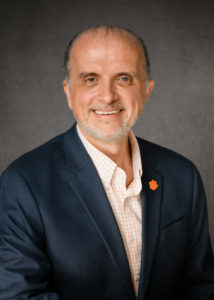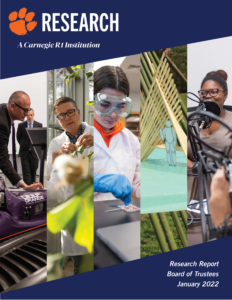
I am excited to share that Clemson was reconfirmed as a Carnegie R1 research university in January. This is the top designation Carnegie awards to doctoral universities with the highest levels of research activity.
A key goal of the ClemsonForward strategic plan, the R1 designation improves our reputation, helps us recruit the best students and faculty members, improves our competitiveness for funding, and invites world-class collaborators both from academia and industry.
Clemson has now reached R1 status for three consecutive classification cycles, moving us closer to our goal of becoming a “perennial Carnegie R1 research institution.” This success is shared by everyone at Clemson; Carnegie tracks research activity and PhD productivity across all disciplines. Despite a global health pandemic, Clemson has continued to improve in the metrics tracked by Carnegie. You can view Clemson’s performance in those metrics in my latest report to the Board of Trustees. I am proud to share that our research enterprise remains healthy. Here are few highlights from the report:
- Clemson’s research enterprise operates efficiently, with strong increases in per-capita productivity over the past eight years.
- Research awards remain strong at $76 million through the second quarter of fiscal year 2022 as Clemson faculty continue to earn high-value awards, and proposal submissions remain high at $313 million through the second quarter.

The quarterly research report also highlights numerous faculty and student achievements. In fact, three faculty members spoke during the quarterly meeting of the Board of Trustees Research and Economic Development Committee to share the impact of their research:
- Rhondda Thomas, Calhoun Lemon Professor of Literature;
- Lior Rennert, assistant professor in the Department of Public Health Sciences; and
- Derek Dalton, Powers Distinguished Fellow in the College of Business.
You can read more about their work, as well as the work of other faculty members, in the full research report online here.
Updates from Funding Agencies
The National Science Foundation (NSF) and the National Institutes of Health (NIH) recently issued updates to proposal requirements.
National Science Foundation (NSF): On Jan. 10, 2022, NSF issued an updated list of activities that must be included in Current and Pending Support documents. This update now requires the following:
- disclosure of start-up packages provided by an organization outside of Clemson University; and
- a brief statement of overall objectives for each item listed on the Current and Pending document (view Item 11 on the FAQ).
National Institutes of Health (NIH): NIH’s Other Support disclosure table is available here. This updated list clarifies the following:
- disclosure of all Honoraria;
- disclosure of mentoring support from outside organizations as in-kind Other Support “if the post-doc or graduate student is performing research activities in support of the PD/PI or other senior/key personnel’s research endeavors;”
- effective Jan. 25, 2022, researchers must certify by electronic signature that the information provided on their Other Support document is “accurate, current and complete.” Information on creating and using an electronic signature is available here. The updated Other Support form with the signature block is available on the NIH FAQ page;
- if foreign appointments and/or employment with a foreign institution are included on the Other Support document, associated contracts/agreements must be provided to NIH with the Other Support form; and
- Other Support disclosure requirements apply to Just-in-Time (JIT), annual progress reports (RPPR), the final progress report, and as soon as possible when it is discovered that Other Support has not been disclosed during any of these instances
A special note on consulting activities: Both NIH and NSF require disclosure of all consulting activities not already disclosed or approved by the university. Clemson faculty are required to disclose all outside activities as described in the Faculty Consulting Policy and the Conflict of Interest Policy, both of which are very broad, so it’s highly unlikely that consulting will need to be disclosed at all on either Current and Pending Support or Other Support documents. If you have questions about whether a consulting activity needs to be disclosed, we recommend that you consult with the Office of Sponsored Programs directly.
If you have any questions about these changes, please contact Dr. Sheila Lischwe, Director, Office of Sponsored Programs, at slischw@clemson.edu.
Thank you for all you do to support scholarship and discovery at Clemson.
–Tanju
